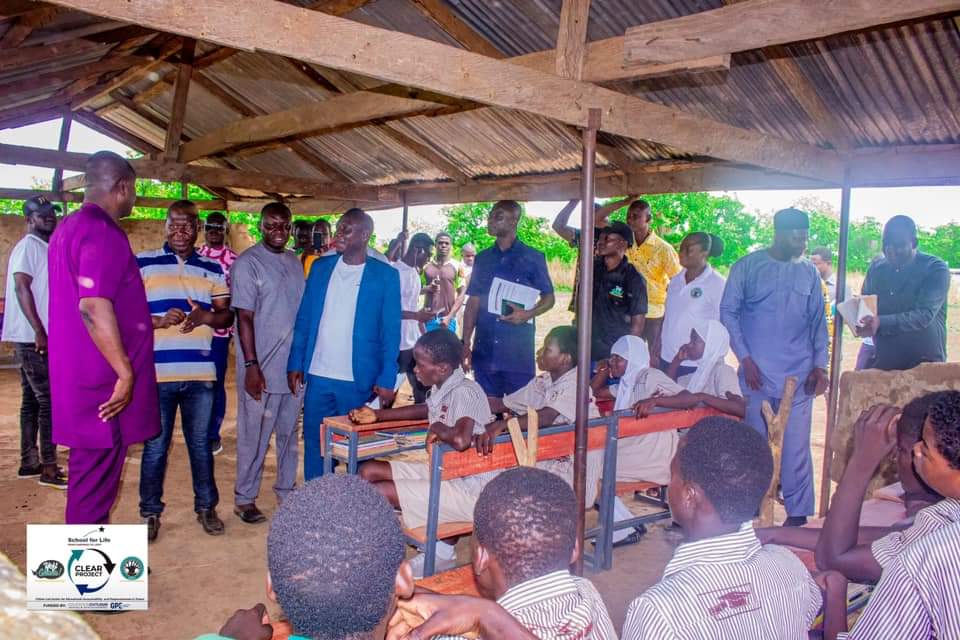By Albert Futukpor
Jinlo (S/R), April 13, GNA – Members of Jinlo, and Fuu communities in the North East Gonja District have engaged the Parliamentary Select Committee on Education, representatives of the Ministries of Education, and Gender on quality basic education delivery challenges in their areas.
Some concerns of the community members, which were contained in a scorecard read by Mr Yakubu Abdul-Rahaman, the Head Teacher of the Jinlo D/A Primary School, centered on delays in paying caterers under the School Feeding Programme (SFP), resulting in irregular service provision by the caterers, which affected learners’ attendance.
They also mentioned inadequate classrooms leading to the practice of multi-grade system in the upper and lower primaries, as well as limited teaching and learning materials for some of the subjects and classes.
The rest were inadequate teachers (only five teachers managing eight classes), saying low teacher deployment from the national level was affecting effective delivery of lessons, and delays in the release of capitation grant.
The concerns of the Fuu community scorecard read by Mr Nyare Issah, the Head Teacher, Fuu D/A Primary School, were similar, with a mention of inadequate furniture, lack of teaching and learning materials for some classes, and delays in the release of the capitation grant.
They also mentioned inadequate capacity building opportunities for staff, irregular cooking by SFP caterers, and lack of ICT textbooks and equipment.

The engagement formed part of the Citizen-led Actions for Educational Accountability and Responsiveness in Ghana (CLEAR) project being implemented by School for Life, YEFL-Ghana and Ghana Developing Communities Association, with funding support from the Global Partnership for Education through the Education Out Loud programme.
The CLEAR project seeks to mobilise citizens’ groups and build their capacities to be able to engage education stakeholders to make them responsive and accountable in addressing the many challenges facing basic education delivery in their communities.
The engagement between community members and the duty-bearers was to enable the latter to appreciate the challenges on the ground and take appropriate steps for redress.
Mr Joseph Kwame Kumah, the Member of Parliament for Kintampo North, and Member of the Committee, said the concerns raised by the two communities were prevalent in other areas nationwide and called for immediate national intervention to address them.
He said the State must prioritise quality basic education, calling on the government to release funds to the various agencies to help fix the concerns.
Dr Bright Yelviel Baligi, the Member of Parliament for Lambussie, and Member of the Committee, commended community members for organising themselves to come up with action plans regarding challenges confronting education in their respective areas.
He assured them that the Parliamentary Select Committee on Education would work within the structures to ensure that their concerns were addressed.
Members of the Committee gave their word to the community members on further engaging the sector Ministries to find lasting solutions to the issues raised.
Nana Baffour Awuah, the Director, Pre-tertiary Education, Ministry of Education, and Mr Nelson Ayaone Akolgo, who represented the Ministry of Gender, Children and Social Protection, promised to share the communities’ concerns with their respective Ministries.
Mr Mohammed Musah Tindawu, the North-East Gonja District Chief Executive, lauded the delegation for the visit to the communities, saying it was the first of its kind in the history of the area in the Savannah Region.
He said this would bring about a reawakening in education and expressed gratitude to the School for Life and its partners, for their interventions in the district to ensure quality education in the area.
Mr Zulyaden Amadu, the Programme Manager, School for Life, said the dialogue between the citizen groups, duty-bearers and policy makers marked a critical milestone in the push for quality education delivery in deprived communities.
He emphasised the need for decision-makers to constantly engage citizens to understand their challenges and seek avenues for redress.
He said the CLEAR project would continue to push and create such spaces to allow for effective interaction to promote access to equitable quality education in rural Ghana.
GNA